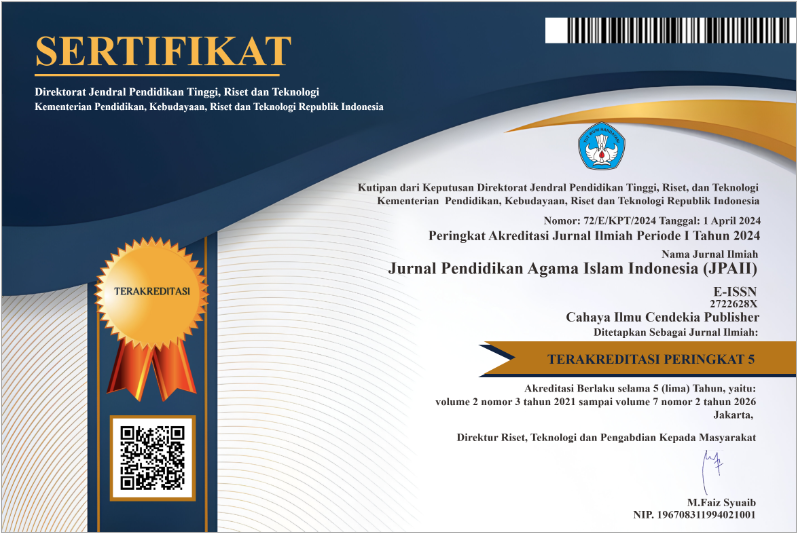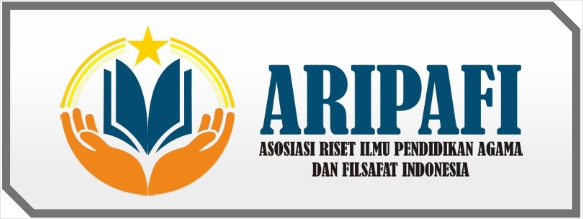Evaluation of Islamic Education: Integrating Cognitive, Moral, and Spiritual Aspects Based on The Qur'an and Hadith
Abstract
Purpose of the study: The purpose of this study is to analyze the concept of educational evaluation from an Islamic perspective based on the Qur'an and Hadith, which includes assessing the cognitive, moral, and spiritual aspects of students based on evaluation principles that balance intellectual and spiritual elements in Islamic education.
Methodology: This research uses a qualitative method with a literature study approach to understand the phenomenon of educational evaluation in the Qur'an and Hadith. The literature search was conducted through national and international journal articles, critically analyzing the sources to identify key concepts, relevant theories, and significant findings, as well as identifying research gaps.
Main Findings: The main findings of this study show that educational evaluation from an Islamic perspective, based on the Qur'an and Hadith, focuses not only on cognitive aspects but also on students' moral and spiritual development. The evaluation process balances intellectual intelligence and piety by assessing character, intention, effort, and devotion. This principle emphasizes the importance of thorough evaluation, both in process and outcome, to form a generation that is knowledgeable, noble, and beneficial to society.
Novelty/Originality of this study: The novelty of this research lies in the emphasis on the concept of educational evaluation in Islam that integrates students' cognitive, moral, and spiritual aspects. This research has findings that are different from those of previous research because it emphasizes the balance between intellectual intelligence and character through the principles of the Qur'an and Hadith, which focus on results and a thorough and sustainable evaluation process.
References
D. Anurogo, D. S. Napitupulu, and M. A. H. R, Esensi Ilmu Pendidikan Islam: Paradigma, Tradisi dan Inovasi. Pustaka Peradaban, 2023. https://books.google.co.id/books?id=r2vREAAAQBAJ&hl=id&source=gbs_navlinks_s
Y. Baiza, “Islamic Education and Development of Educational Traditions and Institutions BT - Handbook of Islamic Education,” H. Daun and R. Arjmand, Eds., Cham: Springer International Publishing, 2018, pp. 77–97. doi: 10.1007/978-3-319-64683-1_7.
M. P. I. Hilyah Ashoumi and H. S. Haj, Pendidikan Karakter Islam. Lembaga Penelitian dan Pengabdian kepada Masyarakat Universitas KH. A. Wahab Hasbullah, 2023. https://books.google.co.id/books?id=5HfXEAAAQBAJ
A. Timbang, “The principles of islamic education according to Abdul Rahman Al-Nahlawi in ‘Usūl Al-Tarbiyah Al-Islămiyyah wa Asălībuha Fi Al Bayt wa Al Madrasah wa Al Mujtama,’” Acad. J. Bus. Soc. Sci., vol. 4, no. 2, pp. 1–19, 2020, https://myjms.mohe.gov.my/index.php/AJoBSS/article/view/11692
K. Nahidin, “Basic Concepts of Evaluation and Its Implications in Evaluation of Islamic Religious Education,” J. Basic Educ., vol. 1, no. 1, pp. 1–9, 2022.
U. S. Anggraheni, A. Nurhuda, S. Ni’am, and S. J. Ni’mah, “The Concept Of Educational Evaluation In Islamic Perspective,” Nusant. Educ., vol. 2, no. 2, pp. 53–64, 2023, https://juna.nusantarajournal.com/index.php/nula/article/view/65
E. Elihami, “Evaluating of Islamic Education: Literature Review,” Sublim J. Pendidik., vol. 01, no. 02, pp. 91–97, 2022, https://ummaspul.e-journal.id/Sublim/article/download/6115/2853
S. P. M. P. Samsul Rizal, Ilmu Pendidikan Islam: (Edisi Revisi). Merdeka Kreasi Group, 2021. https://books.google.co.id/books?id=tIHJEAAAQBAJ
S. A. Rufai, “Teacher Evaluation and Islamic Education, A Critical Perspective BT - Encyclopedia of Educational Philosophy and Theory,” M. A. Peters, Ed., Singapore: Springer Singapore, 2016, pp. 1–5. doi: 10.1007/978-981-287-532-7_537-1.
I. Mohammed, D. Hamadneh, and E. Science, “The principles of measurement and evaluation from the perspective of the Holy Quran (analytic study),” vol. 5, no. 37, pp. 251–259, 2014.
K. Arar, R. Sawalhi, and M. Yilmaz, “The Research on Islamic-Based Educational Leadership since,” Religions, vol. 13, no. 42, pp. 1–23, 2022.
S. Leman and Mahmudi, “Metode Pendidikan Agama Islam dalam Perspektif Al-Quran dan Hadist,” Reslaj Relig. Educ. Soc. Laa Roiba J., vol. 6, no. 11, pp. 5340 –, 2024, doi: 10.47467/reslaj.v6i11.4020.
J. Rustandi and M. Anthoni, “Metode Pembelajaran pada Mata Pelajaran Al Qur ’ an Hadits di Tingkat Madrasah Tsanawiyah,” vol. 1, no. 2, pp. 175–200, 2024.
M. Sofa, “Metode Pendidikan Agama Islam dalam Perspektif Al-Quran,” Adz-Zikr J. Pendidik. Agama Islam, vol. 9, no. 1 SE-, pp. 44–52, Oct. 2024, https://ejournal.stitalkhairiyah.ac.id/index.php/adzzikr/article/view/166
P. Hazrina, A. Oktafia, and S. Aisya, “Evaluasi Pendidikan Dalam Perspektif Al-Qur’an,” vol. 2, pp. 256–272, Jul. 2024, doi: 10.59841/ihsanika.v2i3.1445.
Ruhyan and L. Hakim, “Educational Media in the Perspective of the Qur’an and Al-Hadith,” EduLine J. Educ. Learn. Innov., vol. 4, no. 2, pp. 294–303, 2024, doi: 10.35877/454ri.eduline2705.
D. Yadav, “Criteria for Good Qualitative Research: A Comprehensive Review,” Asia-Pacific Educ. Res., vol. 31, no. 6, pp. 679–689, 2022, doi: 10.1007/s40299-021-00619-0.
W. Lim, “What Is Qualitative Research? An Overview and Guidelines,” Australas. Mark. J., 2024, doi: 10.1177/14413582241264619.
E. Stern, “Philosophies and types of evaluation research,” Found. Eval. Impact Res. Third Rep. Vocat. Train. Res. Eur. Backgr. report., 2004.
A. Konzelmann Ziv, “Self-Evaluation – Philosophical Perspectives BT - Self-Evaluation: Affective and Social Grounds of Intentionality,” A. Konzelmann Ziv, K. Lehrer, and H. B. Schmid, Eds., Dordrecht: Springer Netherlands, 2011, pp. 1–30. doi: 10.1007/978-94-007-1266-9_1.
D. Li, “Introduction: A New Approach to Contemporary Studies on Axiology BT - Values of Our Times: Contemporary Axiological Research in China,” D. Li, Ed., Berlin, Heidelberg: Springer Berlin Heidelberg, 2013, pp. 1–14. doi: 10.1007/978-3-642-38259-8_1.
S. A. E. M. El Balshy and M. Ismael, “Job evaluation as a mechanism for achieving the fairness of a wage structure in the administrative system: theoretical perspectives,” J. Humanit. Appl. Soc. Sci., vol. 5, no. 1, pp. 3–19, Jan. 2023, doi: 10.1108/JHASS-02-2021-0038.
S. Wools, “All about validity: an evaluation system for the quality of educational assessment,” 2015. https://api.semanticscholar.org/CorpusID:106491749
S. Hidayat and C. Anwar, “Konsep Evaluasi dan Pengawasan dalam pendidikan Islam Perpektif Al-Qur’an,” Pendekatan Filsafat Dalam Stud. Islam, vol. 1, pp. 151–157, 2022.
J. S. Rani, Educational Measurement and Evaluation. Discovery Publishing House, 2004. https://books.google.co.id/books?id=CRt893qk8c4C
S. Bayer, E. Klieme, and N. Jude, “Assessment and Evaluation in Educational Contexts BT - Assessing Contexts of Learning: An International Perspective,” S. Kuger, E. Klieme, N. Jude, and D. Kaplan, Eds., Cham: Springer International Publishing, 2016, pp. 469–488. doi: 10.1007/978-3-319-45357-6_19.
Sukatin, Marzani, F. Nabila, E. Mardila, and M. K. Abyad, “Pendidikan Islam dalam Memperkukuh Etika dan Moral,” Hijaz J. Ilmu-Ilmu Keislam., vol. 2, no. 2, pp. 84–87, 2023, doi: 10.57251/hij.v2i2.835.
N. Hadi, “Education Management In Islamic Perspective,” Educ. Adm. Theory Pract., 2024, https://api.semanticscholar.org/CorpusID:270414891
H. A.-B. Saleh, A.-F. A. Shehata, A.-R. A. Abdel-Fattah, and M. M. Hassan, “The philosophy of evaluation in the Islamic educational heritage: Analytical Study,” التربية مجلة علمية محکمة للبحوث التربوية والنفسية والاجتماعية, vol. 42, no. 198, pp. 849–895, 2023, doi: 10.21608/jsrep.2023.310611.
KBBI, “https://kbbi.kemdikbud.go.id/entri/evaluasi.”
L. M. Sari, “Evaluasi dalam Pendidikan Islam,” Al-Tadzkiyyah J. Pendidik. Islam, 2019, https://api.semanticscholar.org/CorpusID:149978147
Y. Fisher, Fisher, Y. "Measuring success: Evaluating educational Programs, US-China Education Review", vol. 7, no. 6, pp. 5-18.,” US-China Educ. Rev., Jan. 2010.
M. Abbas, M. A. Abdul Razak, S. Sikandar, and S. Haneef, “The spiritual dimension of man: An Islamic psycho-spiritual study,” Jan. 2017.
W. M. A. Mohd Amin, M. Ahmad, and A. Abdul Rahim, “Islamic Spirituality and Its Impact on Life as a Muslim,” AL-ITQAN J. Islam. Sci. Comp. Stud., vol. 2, no. 1 SE-Articles, pp. 63–78, Nov. 2018, https://journals.iium.edu.my/al-itqan/index.php/al-itqan/article/view/81
P. Black and D. Wiliam, “Classroom assessment and pedagogy,” Assess. Educ. Princ. Policy Pract., vol. 25, pp. 1–25, 2018, doi: 10.1080/0969594X.2018.1441807.
I. Magdalena, A. Ridwanita, and B. Aulia, “Evaluasi belajar peserta didik,” J. Pendidik. dan Dakwah, vol. 2, no. 1, pp. 117–127, 2020, https://ejournal.stitpn.ac.id/index.php/pandawa
W. D. F. Rohmah, S. Mislikhah, and S. Sutomo, “Teachers Efforts in Evaluating Islamic Religious Education Learning Using Discussion Learning Methods,” JIE (Journal Islam. Educ., vol. 9, no. 1, pp. 268–280, 2024, doi: 10.52615/jie.v9i1.367.
A. Sudijono, Pengantar Evaluasi Pendidikan, XIV. Jakarta: PT . Raja Grafindo Persada, 2015.
A. Suharna, “Evalusi Pendidikan Perspektif Islam,” Qathrunâ, vol. 3, no. 2, pp. 49–68, 2016.
K. Arif and M. Irfan, “Teaching Strategies from Islamic Perspective: An Analytic Study,” vol. 2, pp. 117–130, 2023.
M. Rofiudin, I. Ishaq, and M. Mukaffan, “The Al-Qur’an Learning Evaluation Concept,” Scaffolding J. Pendidik. Islam dan Multikulturalisme, vol. 5, pp. 590–601, 2023, doi: 10.37680/scaffolding.v5i3.3791.
Q. R. Espino and K. K. Tabanao, “Religio Education,” vol. 1, no. 1, pp. 15–24, 2021.
D. Wahyudi, “Konsepsi Al-Qur’an Tentang Hakikat Evaluasi dalam Pendidikan Islam,” HIKMAH J. Islam. Stud., vol. XII, no. 2, pp. 245–272, 2016.
M. . Q. Shihab, Tafsir al-Misbah. Tangerang: Lentera Hati, 2012.
J. M. Spector, “Evaluations of Educational Practice, Programs, Projects, Products, and Policies BT - Learning, Design, and Technology: An International Compendium of Theory, Research, Practice, and Policy,” M. J. Spector, B. B. Lockee, and M. D. Childress, Eds., Cham: Springer International Publishing, 2020, pp. 1–18. doi: 10.1007/978-3-319-17727-4_1-2.
M. Asrori, “Pengertian, Tujuan Dan Ruang Lingkup Strategi Pembelajaran,” Madrasah, vol. 6, no. 2, p. 26, 2016, doi: 10.18860/jt.v6i2.3301.
A. Fanniasl, “Investigating the only basic purpose of human creation from the perspective of the Qur’an,” Seraje Monir, vol. 14, no. 47, pp. 199–230, 2023, doi: 10.22054/ajsm.2023.70241.1868.
J. A. Muskin, “Continuous Assessment for Improved Teaching and Learning: A Critical Review to Inform Policy and Practice,” Curr. Crit. Issues Curriculum, Learn. Assess., no. No. 13, 2017.
Suhendri, “Evaluasi Pendidikan Dalam Perspektif Filsafat Pendidikan Islam,” J. Mhs. Pendidik., vol. 5, no. 1, pp. 1–13, 2023, doi: 10.37286/jmp.v5i1.255.
L. Muhtifah, “Evaluasi Pendidikan Dalam Perspektif Al-Qur’an,” Alqalam, vol. 22, p. 245, 2005, doi: 10.32678/alqalam.v22i2.1379.
N. Rismana, “Evaluasi Pendidikan Menurut Hadis,” Dirasah J. Pemikir. dan Pendidik. Dasar Islam, vol. 7, no. 2 SE-Articles, Aug. 2024, doi: 10.51476/dirasah.v7i2.599.
W. D. Soffandi, Terjemah Syarah Shahiih Muslim, I. Jakarta Selatan: Mustaqiim, 2002, https://digilib.umsu.ac.id/index.php?p=fstream&fid=194&bid=14237
A. Costa et al., “Determinants of academic achievement from the middle to secondary school education: A systematic review,” Soc. Psychol. Educ., 2024, doi: 10.1007/s11218-024-09941-z.
Siti Kholidatur Rodiyah, “Ideal Evaluation in Islamic Education Learning,” EDUTEC J. Educ. Technol., vol. 2, no. 2, pp. 1–5, 2019, doi: 10.29062/edu.v2i2.23.
T. Thani, I. Idriss, A. Abubakar Muhammad, and H. Idris, “The Teaching Methods and Techniques Of The Prophet (PBUH): An Exploratory Study,” J. Hadith Stud., pp. 61–69, 2021, doi: 10.33102/johs.v6i1.128.
M. F. Ashaari et al., “An Assessment of Teaching and Learning Methodology in Islamic Studies,” Procedia - Soc. Behav. Sci., vol. 59, pp. 618–626, 2012, doi: 10.1016/j.sbspro.2012.09.322.
Copyright (c) 2024 Titin Yuniartin, Siti Subaidah, Diah Feriana, Muhamad Arman; Dadang Saepuloh

This work is licensed under a Creative Commons Attribution 4.0 International License.
Authors who publish with this journal agree to the following terms:
- Authors retain copyright and acknowledge that the Jurnal Pendidikan Agama Islam Indonesia (JPAII) is the first publisher licensed under a Creative Commons Attribution 4.0 International License.
- Authors are able to enter into separate, additional contractual arrangements for the non-exclusive distribution of the journal's published version of the work (e.g., post it to an institutional repository or publish it in a book), with an acknowledgment of its initial publication in this journal.
- Authors are permitted and encouraged to post their work online (e.g., in institutional repositories or on their website) prior to and during the submission process, as it can lead to productive exchanges and earlier and greater citation of published work.







.png)
.png)





















